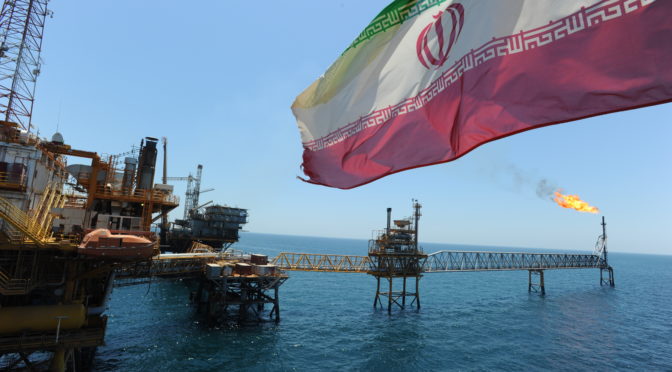Smooth Sailing on Uncertain Waters: How India got waiver on Iranian oil and Chabahar
Posted on : November 18, 2018Author : AGA Admin

The latest tranche of U.S. sanctions targets Iran’s oil exports and transactions between foreign financial institutions and the Central Bank of Iran, potentially taking billions out of Iran’s shrinking revenue stream. However, in a major relief to biggest buyers of Iranian oil including India, the US granted temporary waivers to eight countries and later included Iraq in the list. Last year, China and India were the biggest buyers of Iranian oil, followed by Japan and South Korea.
As the United States withdrew from the Joint Comprehensive Program of Action, JCPOA, hailed as an achievement of multilateral diplomacy, it once again turned to the great power style of dealing with countries on a bilateral or case by case basis, where it is better able to exert pressure and seek concessions. After denying ‘blanket waivers’ to European business operating in Iran, the US approach in granting waivers has been to give countries more time to wind down import of oil from Iran, while also avoiding disrupting global oil markets. The declared goal of the US led economic pressure campaign against Iran is to force the country to stop its involvement in regional conflicts in Syria, Yemen and Iraq, halt its ballistic missile and negotiate a fresh nuclear agreement.
After the Trump administration pulled out from the deal in May this year, India, a country which is a close economic partner of the United States and has deepening ties with Iran, articulated a position based on national interests. When the Iranian Foreign Minister Javad Zarif came to New Delhi seeking support for the continuation of the deal, India assured that ‘it follows only UN sanctions and not unilateral sanctions by any other country.’ However, major Indian private refiners such as Reliance industries, Nayara Energy (formerly Essar Oil), and HPCL-Mittal Energy halted purchase of Iranian oil as soon as the US announced its decision to re-instate sanctions. Given their exposure to the US financial market, they were deterred by the secondary sanctions. These sanctions target third-country financial institutions doing business with Iran by limiting their access to American financial network.
The threat of the US secondary sanctions means that countries interested in continuing trade with Iran and buying Iranian oil would either need to secure a waiver from the United States or find alternative payment mechanisms independent of the US dollar system. Therefore India was in touch with EU as it struggled to create a Special Purpose Vehicle (SPV), which would sidestep the US financial system by providing an EU intermediary to handle trade with Iran. But the slow progress on operationalizing the SPV and the US opposition to the arrangement, denounced by Secretary Pompeo as ‘one of the most counterproductive measures imaginable for regional and international peace and security,’ seemed to have pushed India in seeking a better understanding with the United States.
The fact that these sanctions were not backed by the United Nations mandate and therefore lacked in international legitimacy, New Delhi took a wait and watch approach of working with all parties including the US. When in the first week of October, state-run refiners Indian Oil Corp. Ltd (IOC) and Mangalore Refinery and Petrochemicals Ltd booked Iranian oil for import in November, the volume was nearly half of what they imported earlier in preparations for sanctions. As much as it was seen as India’s willingness to defy US pressure, the reduction in volume was seen as attempt to secure a waiver. When Brian Hook, US special envoy on Iran came to New Delhi to persuade it to slash its imports of Iranian oil, the prospects of shortfall in global supply as a result of embargo on Iranian oil had already sent the oil prices soaring. While the rapid devaluation of rupee against dollar had made it further difficult for the United States to pressurise a country sympathetic to its goals vis-à-vis Iran. Hook left New Delhi declaring that the two countries share the goal of denying Iran the money it needs to destabilise the region.
While the details did not emerge at that time, the two countries had reached a compromise whereby India would be allowed to import Iranian oil, securing its vital economic interests, while not giving Tehran the hard currency it can use to fund its regional geopolitical games. India will make the complete payment for its Iranian oil imports in an escrow account set up in UCO bank, while Iran will have to spend down that amount to pay for its imports from India. The compromise was a significant achievement from the US point of view, since the biggest failing of the JCPOA, as per the Trump administration, is that the deal provided billions to a regime ‘supporting terrorism, fomenting violence and promoting regional instability.’
The US Treasury’s decision to exempt Indian investment in Iran’s Chabahar port is hardly surprising, given President Trump’s South Asia strategy exhorted India to play a bigger role in Afghanistan, especially in the field of economic assistance and development. The railway link between Chabahar and Zahedan on Iran-Afghan border was also exempted from the sanctions. This railway link is to be extended to Mashhad in eastern Iran and thereon to Central Asia and is crucial to operationalize the potential of the port as a gateway to Afghanistan and Central Asia.
Now that more than eight countries have secured waivers to import Iranian oil seem to suggest that repeated declarations by Trump administration officials of the US aim to reduce Iran’s oil revenue to zero were more about creating an atmosphere of uncertainty within which waivers negotiations would have to take place. It also means that the United States may be strong enough to torpedo a multilaterally negotiated deal, but there is a limit to which it can push its unilateral agenda on the world.
Deepika Saraswat
18.10.2018





Leave a Reply